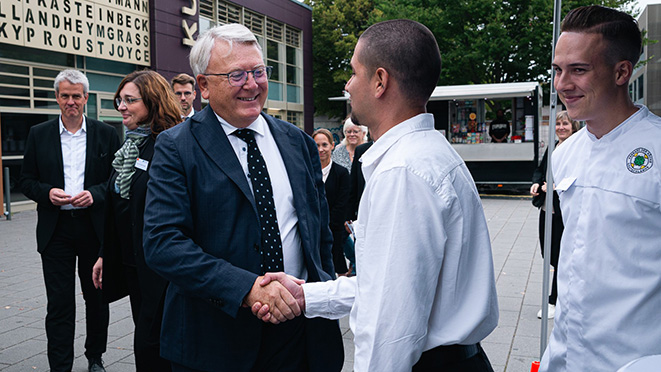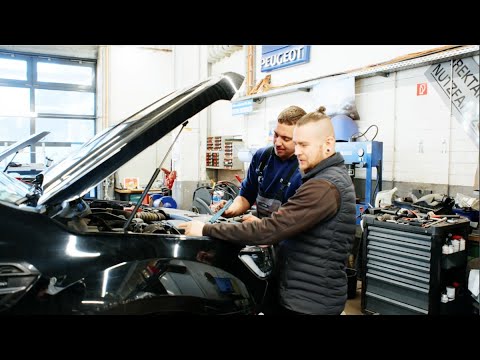
Nicolas Schmit, European Commissioner for Jobs and Social Rights was in Baden-Württemberg, Germany, from 13-15 September 2023 to visit ESF-funded projects that support young people – including those who have left statutory education without a diploma – and give them a second chance for a sustainable career path.
The region has been working closely with the European Social Fund (ESF) for decades to help the region’s most vulnerable – including young people, long-term unemployed and people from a migrant background – to build the skills they need to compete in today’s dynamic labour market.
Schwäbisch Hall – ESF partnership
The Commissioner met representatives of the Arbeiterwohlfahrt (AWO) in Schwäbisch Hall, an organisation whose projects provide perfect examples of how the EU funding in Germany is having a positive effect on the employment prospects and social inclusion of young people. The organisation is one of the six leading independent welfare associations in Germany and maintains over 18 000 facilities and services across the country – including social services for older persons, children and young people, families, migrants and people with disabilities.
In partnership with the ESF, the AWO has been able to deliver real opportunities to young people who need extra support. AWO projects are complemented by other ESF-funded projects in the district, such as the ‘Future Plus‘ project, which gives young people who no longer go to school regularly a second chance at graduating.
Wir Gastfreunde
Long an industrial hub and centre for automotive innovation, Baden-Württemberg relies heavily on young, skilled workers. Co-funded by the ESF+ and implemented through the Baden-Württemberg Ministry of Economic Affairs, the ‘Wir Gastfreunde’ project supports young people to become skilled workers in the hospitality industry. ‘
The centerpiece is the ‘GastroMobil‘, a multimedia-equipped bus that travels to Baden-Württemberg schools and training fairs to recruit young talent. The participants are guided through the world of the hotel and catering industry through exciting tasks and interactive elements. The project then offers trainees a wide range of support, including career and general guidance counselling to help with the transition to a first, skilled position. The participants are guided through the world of the hotel and catering business through exciting tasks and interactive elements.
To ensure the sustainability of the programme, Wir Gastfreunde also helps trainers in small and medium-sized hotels and resorts to build their skills and adapt their coursework for the hospitality staff of tomorrow. To date, the programme has ensured over 600 young people have found skilled work in the hospitality industry, with over 260 hotels finding better ways to train their staff.
Brückenbogen
Implemented by AWO Schwäbisch Hall, the ‘Brückenbogen’ (Building Bridges) project aims to reach students at schools run by the city of Schwäbisch Hall who are at risk of leaving school without a diploma. The project identifies students with special needs so that they can receive intensive individual coaching, prevents early school leaving and ensures young people who have left opportunities to engage with further education and employment services. The project works directly with local and regional employers and further education institutions, giving participants the best chances to re-engage with education or the labour market.
Commissioner Schmit related, 'It was a great pleasure to visit Baden-Württemberg and experience first-hand these projects that would not exist without the ESF. They bring Europe close to people by answering to there concrete needs, for example by giving young people confidence and trust and by this open new prospects for their future. Especially in these times of uncertainty and transformation, we need to step up our efforts to strengthen social cohesion. The engaged people I have met during these two days are doing exactly this.'
These projects highlight how vital EU investments are for supporting young people at risk. The ESF+ is a huge part of this equation and remains the European Union's main instrument for investing in people and a cornerstone for the implementation of the European Pillar of Social Rights – ensuring young people will have the skills they need for the green and digital transitions.



